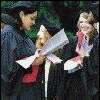 |
|
CLEARING THE AIR ON CLIMATE CHANGE: YORK UNIVERSITY'S CENTRE FOR APPLIED SUSTAINABILITY TO HOST TIMELY BRIEFING TORONTO, November 10, 1997 -- Only one month before a crucial international meeting in Kyoto, Japan to negotiate an agreement on greenhouse gases, the Canadian public is caught in a crossfire of claims and counter claims surrounding the climate change debate. The issue has been hotly debated in Parliament and in the media. On Monday, November 17, the Centre for Applied Sustainability at York University's Faculty of Environmental Studies will host one of five cross-Canada day-long briefings to provide comprehensive and balanced answers to lingering scientific, economic and public policy questions about climate change. The briefing at York University is one of five organized by the Canadian Global Change Program of the Royal Society of Canada and university partners across the country. Similar sessions have been or will be held in Calgary, Vancouver, Montreal and Halifax. The goal is to provide decision makers in business, public interest organizations, government and environmental groups with credible scientific information about climate change. David Bell, the Director of the York Centre for Applied Sustainability in the Faculty of Environmental Studies, sets out the context: Business lobbies such as the Business Council on National Issues argue for a cautious approach to cutting greenhouse gas emissions. Environmental groups and some business interests such as the insurance industry argue for action now. There is a scientific consensus that humans are causing serious damage to the planet through the emission of greenhouse gases. But a minority of scientists refutes these claims, and denies the need for action. And the Canadian government is caught in the middle of all this, with the difficult task of developing an acceptable Canadian position in Kyoto. "We have organized these briefings to provide a better understanding of climate change and the related technical and policy issues that exist at a national and international level. By gathering together a wealth of expertise and understanding, we can get a better grasp on the key issues that Canada is facing, how they affect different regions of the country, and how people can become more involved," said Bell. Hugh Morris, Chair of the Board of the Canadian Global Change Program of the Royal Society of Canada, said the Kyoto meeting "is proving to be a wake-up call for Canada to get moving on significant policy action on climate change. The world will be waiting to see how prepared Canada is to live up to its international commitments to combat the threats of climate change." The briefing will begin with a session on the environmental impact of climate change and the economic and social costs of controlling or allowing greenhouse gas emissions. Afternoon sessions include presentations by federal and provincial government representatives outlining their positions on climate change, as well as a discussion of the international and national negotiating process. In the final panel discussion, participants from Pollution Probe, Imperial Oil and Sorema Management Inc (a management consulting firm) will weigh in on the question: "What Should Canada Do in Kyoto and Beyond?"
WHEN:
WHERE: The Royal Society of Canada is an independent, non-profit organization that was incorporated by an act of Parliament in 1883. Its primary objective is to promote learning and research in the arts, letters and sciences in Canada. Its Canadian Global Change Program was founded in 1985 to combine the natural and human dimensions of global change, and to bring together scientists and other specialists to plan interdisciplinary research and assess the impact of this research on policy. The York University Centre for Applied Sustainability, Faculty of Environmental Studies was established in June 1996 to act as a university-wide focus for research into sustainability. The Centre focuses the efforts of business, academia, government and other stakeholders on applying knowledge about environmental sustainability to our political, economic, health and social systems.
For more information or for further background materials, please contact:
Sine MacKinnon
Alison Masemann |
|
|
| | Welcome to York University | Latest Release | Release Archives | |
![[to York's Home Page]](../../images/yorklogos.gif)
